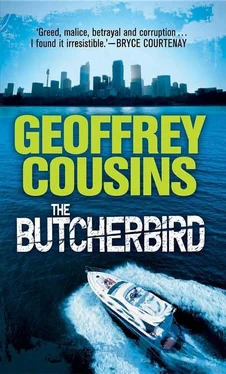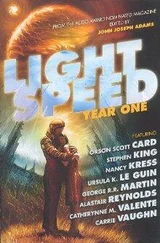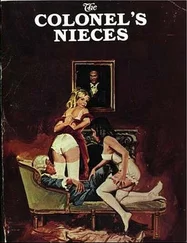Geoffrey Cousins - The Butcherbird
Здесь есть возможность читать онлайн «Geoffrey Cousins - The Butcherbird» весь текст электронной книги совершенно бесплатно (целиком полную версию без сокращений). В некоторых случаях можно слушать аудио, скачать через торрент в формате fb2 и присутствует краткое содержание. Жанр: Триллер, на английском языке. Описание произведения, (предисловие) а так же отзывы посетителей доступны на портале библиотеки ЛибКат.
- Название:The Butcherbird
- Автор:
- Жанр:
- Год:неизвестен
- ISBN:нет данных
- Рейтинг книги:5 / 5. Голосов: 1
-
Избранное:Добавить в избранное
- Отзывы:
-
Ваша оценка:
- 100
- 1
- 2
- 3
- 4
- 5
The Butcherbird: краткое содержание, описание и аннотация
Предлагаем к чтению аннотацию, описание, краткое содержание или предисловие (зависит от того, что написал сам автор книги «The Butcherbird»). Если вы не нашли необходимую информацию о книге — напишите в комментариях, мы постараемся отыскать её.
The Butcherbird — читать онлайн бесплатно полную книгу (весь текст) целиком
Ниже представлен текст книги, разбитый по страницам. Система сохранения места последней прочитанной страницы, позволяет с удобством читать онлайн бесплатно книгу «The Butcherbird», без необходимости каждый раз заново искать на чём Вы остановились. Поставьте закладку, и сможете в любой момент перейти на страницу, на которой закончили чтение.
Интервал:
Закладка:
What words that tug at the core, he thought. Not we want you, but we need you. Jack was already partly lost with those words, he knew it even though he wouldn’t yet allow a decision to form. He certainly wouldn’t voice one to Louise, to anyone.
‘So what’ve you been up to with Mac Biddulph? Out on the floating girlie palace and all, I hear?’
He started at the stentorian tones of Tom Smiley. How could Tom know he’d been seeing Mac Biddulph? Was this city the glass bowl people said it was, where a thousand eyes watched every time the orb was shaken and the fake snow fell on a different branch? He tried to change the subject, to laugh off the question with a Jack-the-lad response, but if Louise could detect dissembling, the professional antenna of Thomas Smiley caught the false notes as clearly as bellbirds calling in a forest.
The barrage that followed pinned him with its forensic intensity and before he was aware of the prising open of his soul, he was spilling details of not just the weekend’s capers but the conversation in Mac’s office, his initial doubts, even the possibility, the possibility he hadn’t admitted to himself, that he might take this challenge. Yes, it was a challenge-a stretching of his abilities, a leap from being the charming property developer to the leader of a major business, a critical business for the average Australian, a business people depended on in crisis, a complex, intellectually demanding exercise that he could drive forward better than anyone else. Mac had said so. Before he knew it, all this had tumbled forth into Tom’s waiting arms where so many witnesses had relieved themselves unsuspectingly of their burdens in the past.
‘Be careful, Jack.’ The shrewd eyes assessed the rush of adrenalin sitting beside them. ‘These blokes are tough customers, Mac Biddulph and his cohorts. Have you met the chairman, Laurence Treadmore, sometime member of my esteemed profession? Very subtle character, if I can put it that way. Quite deep. You need to know what you’re getting into, Jack, if you’re really thinking about this. It would be quite a stretch from a number of points of view. A big stretch.’
Jack flashed him an angry glance. ‘Too big for me, you think?’ ‘I didn’t mean that, old fellow. It’s just that there are a lot of very complex issues in that industry and you need to work with people you can trust a hundred per cent. I’m not saying you can’t with this gang, but how well do you know them?’ He paused and saw the resentment on Jack’s face. ‘Talk to the Pope if you’re really contemplating this. He knows a bit about it. Don’t rush into anything is all I’m saying. Beware of hubris and flattery lest you slip on their greasy surfaces.’
chapter three
Laurence Treadmore nodded at the doorman of the Piccadilly Apartments without actually looking at him, stepped briskly into the familiar environs of Macquarie Street and commenced the daily triumphal perambulation to his office. He liked to think of the morning walk in this way-’a triumphal perambulation’. Because it was. Every few steps some passer-by would greet him as he wandered by the Colonial Club, the Anon Club, the great office buildings that housed the heads of companies who nodded to him deferentially. The Sydney office of the Prime Minister hidden away in one, hidden but well known to Sir Laurence, the tower of the state government and the Premier-all this a few paces from his home and open and welcoming to him, if not to others; a source of honours and wealth, of comfort and privilege, to him if not to others. For Sir Laurence was widely known for his intellectual flexibility. He could understand and appreciate any point of view, particularly if significant benefits might result from it for a client. And, of course, for the advisor.
Sir Laurence had never been a lawyer in the conventional sense. His was more a ‘strategic commercial practice’, in the course of which he guided clients through the intricacies of takeover law or contract negotiations or other complex matters of a more delicate nature. This tributary of the law allowed fees to be charged of a very different dimension to those based on the simple hours of toil which the lesser members of his profession received. ‘Success fees’ and other ripe fruit fell into his basket, the harvest of a merchant banker more than a lawyer. Indeed he would have been appalled to regard himself as a ‘lawyer’-the law was merely a useful or annoying reference point, depending on the circumstances.
His small, neat figure in its tailored suit from Savile Row, trademark pink shirt of a certain soft hue, and matching silk tie and handkerchief were familiar to all who were familiar, as it made its way at eight-thirty every morning to the flower stall in Martin Place. Here he purchased a boutonnicre of complementary hue, contrast was not a fashion concept of which he approved, before entering his offices and arriving at a desk which would already be laid out with Earl Grey tea and a croissant from La Gerbe d’Or in Paddington. He liked to breakfast alone. In the early years Mavis had often encouraged him to start the day in conversation at their table, but he found it unsettling. After nearly forty years of marriage she’d learned to hand him his briefcase and watch his straight back walk to the lift, as she’d learned so many things. Besides, Sir Laurence was a secretive man in certain ways, and he liked to be unobserved as he took his gilt scissors and cut items from the newspapers about people who might be useful or might need his arcane skills, or deals or possibilities, or scandals and indiscretions that could cause alliances to crumble and crumbs to fall. All these clippings were pasted into albums and filed in a tall locked cupboard in the hallway leading to his office-decades of the detritus of social and business life, discarded by all except him. It was remarkable how often he fossicked through these files and turned up a nugget.
He had a deep and productive relationship with certain sections of the press. Whereas most of his colleagues and most business people he knew were cautious and wary in their dealings with journalists, if not downright hostile, Sir Laurence had a passing affection for those who fell within his sphere. These were business journalists of a serious bent, columnists of a gossipy disposition and one or two editors who saw a future role in management. The relationships were deep, in the sense that they were hidden from view, and no public hint of the source of information was ever given by those who received his calls-they were never to call him. Productive, in the sense that the chosen ones would receive information that was not otherwise available and frequently should not have been so, while Sir Laurence or those he represented would be depicted as champions of all that was right and just. It was surprising what could be achieved in this way. People could gain positions of importance, people could lose them. Government ministers could change their minds on vital issues (after all, their job was surely to represent public opinion). Institutions who’d planned to vote one way at a public meeting might vote quite differently. Productive, and no fingerprints.
At one time or another, Laurence Treadmore had been chairman of trustees of the Museum of Modern Art, chairman of the Australian Opera and the New South Wales Public Library, and president of the King’s School Foundation. Many other institutions tried to woo him to their causes but he no longer accepted simple directorships. And as to charity boards, he preferred to send a cheque. Occasionally he went to a major charity auction and made a spectacular bid or two, in which case the press contacts would be alerted beforehand. A detailed examination of his custodianship of these appointments wouldn’t reveal a record of great success-Sir Laurence was fundamentally lazy, and the hard work of planning or fundraising was not to his liking-but no such examination was ever made and his timing was always impeccable. He’d gone, moved on, leaving the next incumbent to patch up the holes.
Читать дальшеИнтервал:
Закладка:
Похожие книги на «The Butcherbird»
Представляем Вашему вниманию похожие книги на «The Butcherbird» списком для выбора. Мы отобрали схожую по названию и смыслу литературу в надежде предоставить читателям больше вариантов отыскать новые, интересные, ещё непрочитанные произведения.
Обсуждение, отзывы о книге «The Butcherbird» и просто собственные мнения читателей. Оставьте ваши комментарии, напишите, что Вы думаете о произведении, его смысле или главных героях. Укажите что конкретно понравилось, а что нет, и почему Вы так считаете.












